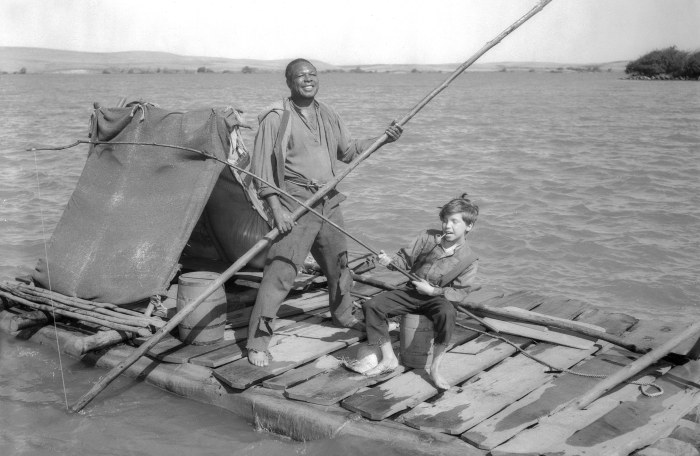In adventures of huckleberry finn how might jims dialect – In “The Adventures of Huckleberry Finn,” Jim’s dialect serves as a profound linguistic tapestry that weaves together his social status, personal experiences, and the novel’s overarching themes of race and identity.
Through a meticulous analysis of Jim’s speech patterns, this essay delves into the significance of his dialect, exploring its impact on characterization, narrative realism, and the reader’s understanding of the novel’s complex social landscape.
Jim’s Dialect in “The Adventures of Huckleberry Finn”

Jim’s dialect in Mark Twain’s “The Adventures of Huckleberry Finn” is a distinctive and essential aspect of his characterization. It reflects his social status as a slave and his experiences growing up in the antebellum South.
Linguistic Features of Jim’s Dialect
- Pronunciation:Jim’s dialect is characterized by a distinctive pronunciation, including the use of “dey” for “they,” “dat” for “that,” and “gwine” for “going.”
- Grammar:Jim’s grammar is often non-standard, with irregular verb conjugations and the use of double negatives.
- Vocabulary:Jim’s vocabulary is rich in African American vernacular, including words and phrases such as “tote,” “jamboree,” and “gumbo.”
Significance of Jim’s Dialect
Jim’s dialect plays a crucial role in shaping his character and contributing to the novel’s themes of race and identity.
- Characterization:Jim’s dialect reflects his unique perspective and experiences, making him a more relatable and sympathetic character.
- Themes of Race and Identity:Jim’s dialect highlights the racial prejudices and social inequality that existed in the antebellum South, forcing him to speak in a way that conforms to the expectations of white society.
- Reader’s Understanding:Jim’s dialect influences the reader’s understanding of the novel by providing a glimpse into the experiences and perspectives of an African American character during a time of great racial tension.
Jim’s Dialect in Context
Jim’s dialect is not isolated within the novel but exists alongside other dialects spoken by different characters.
- Comparison to Other Dialects:Jim’s dialect differs significantly from the standard English spoken by white characters, reflecting the social and cultural divisions of the time.
- Historical and Cultural Factors:Jim’s dialect is influenced by the historical and cultural context of the antebellum South, including the experiences of enslaved African Americans.
- Language of the Time Period:Jim’s dialect reflects the language and speech patterns of the time period in which the novel is set.
Jim’s Dialect as a Literary Device, In adventures of huckleberry finn how might jims dialect
Twain uses Jim’s dialect as a literary device to achieve various effects within the novel.
- Humor and Irony:Jim’s dialect often creates humor and irony, highlighting the absurdities and contradictions of the society in which he lives.
- Realism and Authenticity:Jim’s dialect contributes to the novel’s realism and authenticity by providing a realistic portrayal of the language and speech patterns of the time period.
- Overall Impact:Jim’s dialect enhances the novel’s overall impact by creating a memorable and distinctive character and contributing to the novel’s themes of race, identity, and social inequality.
Essential FAQs: In Adventures Of Huckleberry Finn How Might Jims Dialect
How does Jim’s dialect reflect his social status?
Jim’s use of non-standard grammar, pronunciation, and vocabulary reflects his position as an enslaved individual in the antebellum South.
In what ways does Jim’s dialect contribute to the novel’s themes of race and identity?
Jim’s dialect challenges prevailing notions of racial superiority, highlighting the arbitrary nature of social hierarchies and the resilience of human dignity in the face of adversity.
How does Jim’s dialect enhance the novel’s realism and authenticity?
Twain’s meticulous depiction of Jim’s dialect grounds the novel in the historical and cultural context of the antebellum South, lending credibility to the characters and their experiences.



